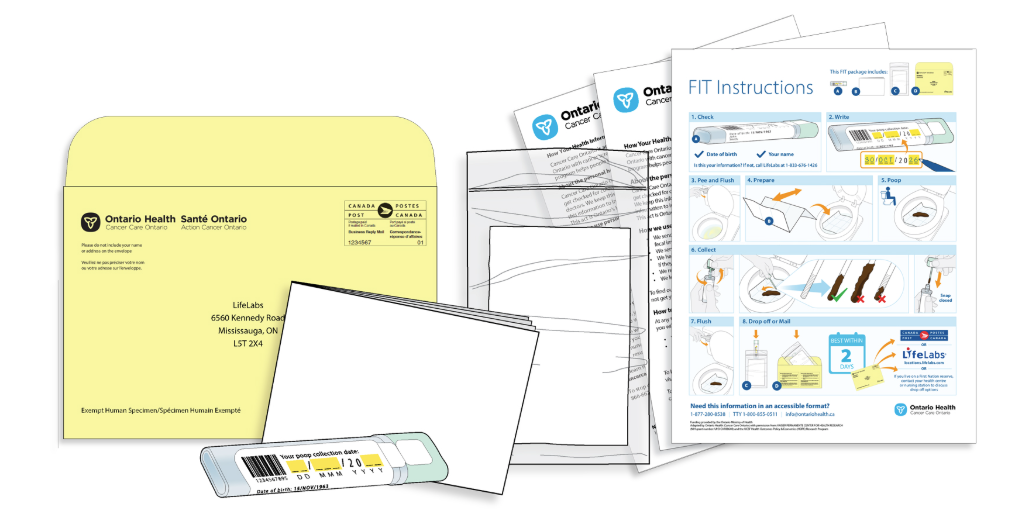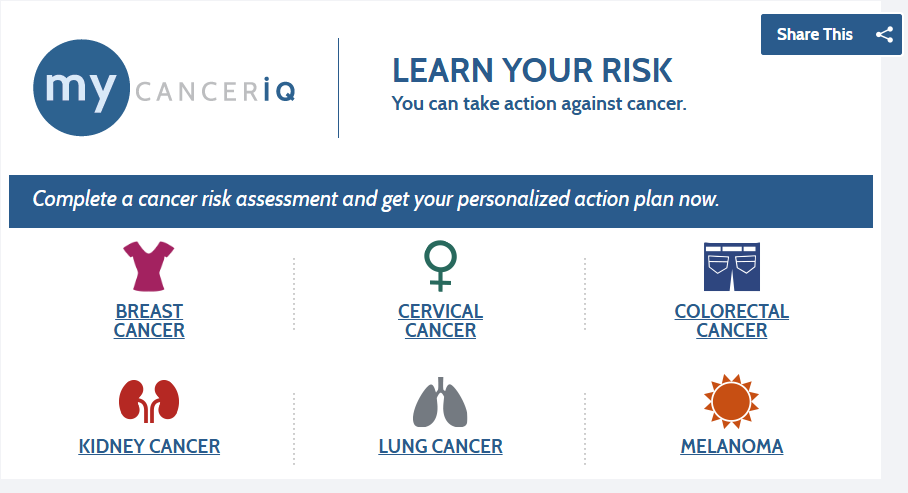Cancer Screening Saves Lives – Get Checked and Reduce Your Risk!

Regular screening is important because it can prevent or detect cancer early when treatment is more likely to be effective. Cancer screening involves testing people who are at risk of developing cancer but have no symptoms and generally feel fine.
What is Cancer?
Cancer is a disease that begins when cells grow abnormally and divide more rapidly than normal cells. When a cell becomes damaged, the body tries to repair or eliminate it. However, sometimes these damaged cells aren't removed, and they keep dividing and multiplying. Cancer continues to be the leading cause of death in Canada, with 1 in 2 Canadians being diagnosed with cancer in their lifetime.
Breast cancer most often starts in the cells lining the milk ducts. It is the most common cancer in women, with 1 in 8 women developing breast cancer in their lifetime. We encourage all women to be "breast aware," meaning they should know how their breasts normally look and feel and what changes to look for. If you notice any changes, report them to your family doctor or nurse practitioner. The regular screening for breast cancer is a mammogram, which is a low-dose x-ray of the breasts. A few risk factors for breast cancer include but not limited to; being a woman of increasing age, a personal or family history of breast cancer, BRCA gene mutations, and certain lifestyle factors. Most people who develop breast cancer have NO family history, this is why it is important for everyone to be screened.
Colorectal (or colon) cancer typically begins as a non-cancerous polyp, which can become cancerous over time. Removing these polyps can prevent colon cancer. Colon cancer is the second leading cause of cancer related deaths in Ontario, with 93% of cases affecting individuals over the age of 50. Colon cancer can be prevented or successfully treated if detected early. The provincial test for colon cancer is the at-home Fecal Immunochemical Test (FIT), which looks for traces of blood in stool. If the test is positive, it does not necessarily mean you have colon cancer, but further tests, like a colonoscopy, are required.
Cervical cancer starts in the cervix, the part of the female reproductive system that connects the uterus to the vagina. It is mainly caused by the Human Papillomavirus (HPV) infection, a highly contagious sexually transmitted infection that spreads through skin-to-skin contact in the genital area; penetration is not required. Cervical cancer primarily affects women aged 30-59, with 1600 Canadian women diagnosed in 2024. Both men and women can be infected with HPV, and over 75% of sexually active Canadians will have at least one HPV infection in their lifetime. It is important to note that most HPV infections go away on their own within 1-2 years, but some infections persist and may cause cervical cancer. A positive HPV test does not mean you have cervical cancer, but further tests may be necessary. There are several ways to reduce your risk of HPV infection: limit the number of sexual partners, use condoms (the area around the condom can be infected with HPV), quit smoking, get vaccinated against HPV, and have regular Pap smears.
Lung cancer starts in the cells of the lungs, which are located in the chest. Lung cancer is the most commonly diagnosed cancer in Canada and the leading cause of death for both men and women, with over 32,000 cases in 2024. Several risk factors contribute to the development of lung cancer, including smoking, second-hand smoke, radon exposure, asbestos, occupational exposure to certain chemicals, outdoor air pollution, and personal or family history of lung cancer or lung disease.
What is Cancer Screening?
Cancer screening involves regular clinical tests or examinations, such as mammograms for breast cancer, stool tests for colon cancer, Pap tests for cervical cancer and low-dose CT scans for lung cancer.
Ontario has four cancer screening programs, each with its own criteria:
· Ontario Breast Screening Program (OBSP): Screening is available for average-risk women aged 40-74 with no current breast symptoms or family history. These women can have a mammogram every 2 years through the OBSP without a requisition from their family doctor or nurse practitioner. The OBSP also offers a high-risk program for women aged 30-69 who are known carriers or first-degree relatives of BRCA gene mutations, have a family history, or received chest radiation before age 30. Speak to your family doctor or nurse practitioner for more information on the high-risk OBSP. To find the closest OBSP location, click here.
· Ontario Cervical Screening Program: Screening is available for anyone with a cervix age 25-70 who has ever been or is currently sexually active. They can see their primary care provider for a Pap test every 3 years. Cervical screening can stop after age 70 if they have had three normal Pap tests in the last 10 years.
Colon Cancer Check: Screening is available for average-risk individuals age 50-74 with no family history or current symptoms. These individuals should complete a FIT every 2 years. For those at increased risk (e.g., with a parent, sibling, or child who has been diagnosed with colon cancer), speak to your family doctor or nurse practitioner to discuss a referral for a colonoscopy, which should start at age 50 or 10 years earlier than the relative's diagnosis.

Ontario Lung Screening Program: Screening is available for individuals at high risk for lung cancer, aged 55-74, who have smoked every day for at least 20 years (not necessarily consecutively). These individuals are offered a special type of computer tomography (CT) scan called a "low-dose CT scan," which uses a small dose of radiation. Lung cancer screening is available at specific locations here.
To learn more about these screening programs and to find out if you are eligible, please visit The Central Regional Cancer Program.

Who Can Help?
It is important for individuals who are due or overdue for cancer screening to talk to their family doctor or nurse practitioner. If you do not have a family doctor or nurse practitioner, call Health811 or register online here.
What Resources Are Available?
The Central Regional Cancer Program with Cancer Care Ontario understands the importance of prevention and early detection when it comes to cancer. We encourage Ontario residents to get screened through the provincial screening programs. To learn more, visit us at www.screen4cancer.ca or follow us on Instagram or Facebook @screen4cancer.
In addition to routine cancer screening, you can reduce your risk of cancer by staying physically active, eating a balanced diet high in fiber, limiting or avoiding alcohol, practicing sun safety, and living tobacco-free. To learn more about reducing your cancer risk, visit the Canadian Cancer Society.
For resources on quitting smoking and vaping, visit screen4cancer.ca/quitting smoking
To learn more about your cancer risk, visit MyCancerIQ to complete a cancer risk assessment and receive your personalized action plan.

This year, make your health a priority. By routinely participating in cancer screening, you are taking charge and inspiring your family and community to do the same. Share this information with the people closest to you, screening saves lives and you can to.




